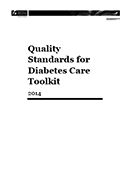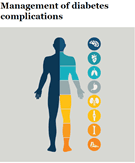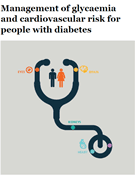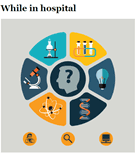
This toolkit relates to a previous version of the Quality Standards for Diabetes Care. The latest version of the standards is available at Quality Standards for Diabetes Care 2020.
Summary
The Ministry of Health is supporting the implementation of the Quality Standards for Diabetes Care by providing this toolkit, which includes the rationale for each standard, as well as implementation and evaluation advice. This toolkit provides resources and information to support service planning and delivery.
The toolkit has been developed for easy reading and reference. Although many of the Standards are related, each is addressed separately with an introduction that includes academic rationale and evidence, implementation advice, implementation examples and innovations, assessment tools, and resources. Where possible, links are provided to take you directly to the corresponding website or resource.
For each standard
For each standard there are 7 key sections.
- Introduction – A general description/expansion of the standard incorporating the evidence/academic rationale underlying the standard.
- Guidelines – Specific guidelines of care pertaining to each standard. New Zealand Guidelines are presented with priority. International guidelines and/or expert/consensus/position statements are provided where New Zealand guidelines do not exist and/or to provide additional information.
- Implementation advice – Suggestions for how the guidelines associated with the standard can be put into practice or realised.
- Implementation examples/Innovations – Descriptions of models of service delivery/care which exemplify the standard in practice. These may describe a practice model or include the results of an evaluation with outcomes.
- Assessment tools – A range of potential quality indicators and/or service evaluation/outcome measures for each Standard to measure effectiveness of implementation.
- Resources – A repository for links to resources that might be useful in implementing the standards or recommendations linked to a standard. It may include:
- handouts for patients
- links to website resources for patients/professionals
- patient-specific assessment tools such as patient questionnaires.
- References – References for each standard.
Full toolkit
- Quality Standards for Diabetes Care Toolkit 2014 (PDF, 2.1 MB)
- Quality Standards for Diabetes Care Toolkit 2014 (Word, 1.8 MB)
Individual standards
 Basic care, self-management and education
Basic care, self-management and education
- Standard 1 (PDF, 508 KB) – People with diabetes should receive high quality structured self-management education that is tailored to their individual and cultural needs. They and their families/whānau should be informed of, and provided with, support services and resources that are appropriate and locally available.
- Standard 2 (PDF, 342 KB) – People with diabetes should receive personalised advice on nutrition and physical activity, together with smoking cessation advice and support if required.
- Standard 3 (PDF, 397 KB) – People with diabetes should be offered, as a minimum, an annual assessment for the risk and presence of diabetes-related complications and for cardiovascular risk. They should participate in making their own care plans, and set agreed and documented goals/targets with their health care team.
- Standard 4 (PDF, 356 KB) – People with diabetes should be assessed for the presence of psychological problems with expert help provided if required.
 Management of glycaemia and cardiovascular risk for people with diabetes
Management of glycaemia and cardiovascular risk for people with diabetes
- Standard 5 (PDF, 359 KB) – People with diabetes should agree with their health care professionals to start, review and stop medication as appropriate to manage their cardiovascular risk, blood glucose and other health issues. They should have access to glucose monitoring devices appropriate to their needs.
- Standard 6 (PDF, 262 KB) – People with diabetes should be offered blood pressure, blood lipid and anti-platelet therapy to lower cardiovascular risk when required in accordance with current recommendations.
- Standard 7 (PDF, 392 KB) – When insulin is required it should be initiated by trained health care professionals within a structured programme that, whenever possible, includes education in dose titration for the person with diabetes.
- Standard 8 (PDF, 324 KB) – People with diabetes who do not achieve their agreed targets should have access to appropriate (and timely) expert help.
 Management of diabetes complications
Management of diabetes complications
- Standard 9 (PDF, 322 KB) – All people with diabetes should have access to regular retinal photography or an eye examination, with subsequent specialist treatment if necessary.
- Standard 10 (PDF, 499 KB) – All people with diabetes should have regular checks of renal function (eGFR) and albuminuria or proteinuria (ACR or PCR) with appropriate management and/or referral if abnormal.
- Standard 11 (PDF, 357 KB) – People with diabetes should be assessed for the risk of foot ulceration and, if required, receive regular review. Those with active foot problems should be referred to and treated by a multidisciplinary foot care team within recommended timeframes.
- Standard 12 (PDF, 243 KB) – People with diabetes with serious or progressive complications should have timely access to expert/specialist help.
 While in hospital
While in hospital
- Standard 13 (PDF, 456 KB) – People with diabetes admitted to hospital for any reason should be cared for by appropriately trained staff, and provided access to an expert diabetes team when necessary. They should be given the choice of self-monitoring and encouraged to manage their own insulin whenever clinically appropriate.
- Standard 14 (PDF, 259 KB) – People with diabetes admitted as a result of uncontrolled diabetes or with diabetic ketoacidosis should receive educational support before discharge and follow-up arranged by their GP and/or a specialist diabetes team.
- Standard 15 (PDF, 333 KB) – People with diabetes who have experienced severe hypoglycaemia requiring emergency department attendance or admission should be actively followed up and managed to reduce the risk of recurrence and readmission.
 Special groups
Special groups
- Standard 16 (PDF, 344 KB) – Young people with diabetes should have access to an experienced multidisciplinary team including developmental expertise, youth health, health psychology and dietetics.
- Standard 17 (PDF, 339 KB) – All patients with type 1 diabetes should have access to an experienced multidisciplinary team, including expertise in insulin pumps and continuous glucose monitoring systems when required.
- Standard 18 (PDF, 415 KB) – Vulnerable patients, including those in residential facilities and those with mental health or cognitive problems, should have access to all aspects of care, tailored to their individual needs.
- Standard 19 (PDF, 326 KB) – Those with uncommon causes of diabetes (eg, cystic fibrosis, monogenic, post-pancreatectomy) should have access to specialist expertise with experience in these conditions.
- Standard 20 (PDF, 260 KB) – Pregnant women with established diabetes and those developing gestational diabetes mellitus (GDM) should have access to prompt expert advice and management, with follow-up after pregnancy. Those with diabetes of child-bearing age should be advised of optimal planning of pregnancy including the benefits of pre-conception glycaemic control. Those not wishing for a pregnancy should be offered appropriate contraceptive advice as required.
